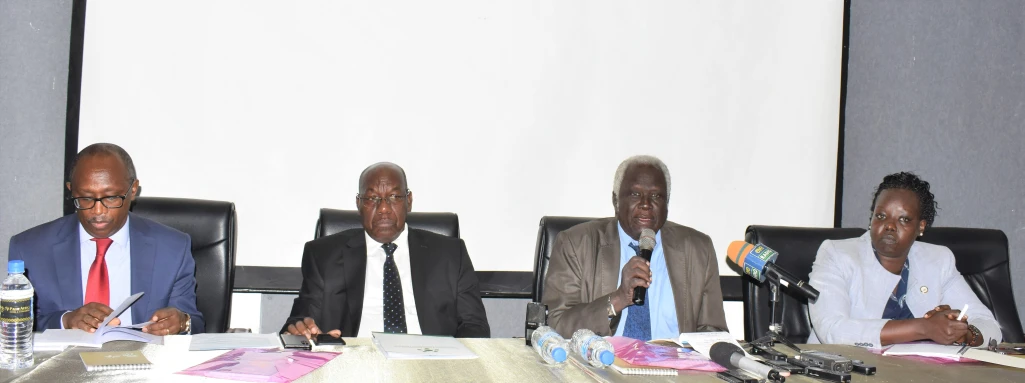
Stakeholders have been urged to diligently deliberate on the electoral law to help South Sudan transition to a democratic state.
Under the National Constitution Amendment Committee (NCAC), representatives of the parties and other stakeholders in the revitalized peace deal met in Juba on Monday to discuss reforms of the Election Act 2012.
The NCAC is the body tasked by the 2018 peace deal to draft new or revise, as appropriate, legislations such as the permanent constitution, national security, Political Parties Act 2012, National Elections Act 2012, and other relevant reforms.
Its members have embarked on the review and amendment process of the laws governing the conduct of elections in South Sudan in order to conform to the peace agreement.
“It is very, very important that we all look at the provisions of the law carefully so that we can have the best provisions to produce a best election that is possible under the circumstances,” said Gichira Kibara, chairperson of NCAC.
The agreement says, once it is amended, the President, in consultation with the parties and with the approval of the national legislature shall reconstitute a competent and impartial National Elections Commission (NEC) to conduct elections.
The NEC is expected to organize elections – 60 days before the end of the Transitional Period in accordance with the provisions of the Permanent Constitution, and to ensure that the outcome of the election is broadly reflective of the will of South Sudan electorate.
“The election that will be taking place 60 days before the end of the transitional period is a critical election both for choosing the leaders and also transiting the country to the next dispensation,”Kibara underscored.
The Deputy Speaker of the Council of States, Hon. Mary Ayen Majok advocated for the inclusion of all legislators to ensure there is ownership over the outcome of the process.
“The sensitivity in the procedures of participation of the legislature in particular the 2 Houses should be considered by this forum (NCAC) because some of the concerns that happened last time in regards to the Political Parties’ bill that resulted in the boycott by the SPLM-IO [should not happened again],” she stated.
In June, the SPLM-IO walked out of the debate to pass the Political Parties Amendment Bill 2022. It raised concerns over the modalities of financing political parties and the conditions for a party to be legally registered. The bill was passed despite their reservations.
On August 3, Dr. Riek Machar’s party also boycotted the tabling of the draft national budget for the fiscal year 2022/2023 at the transitional national legislature.
On August 15, the SPLM-IO legislators resumed work following a conciliatory meeting between President Salva Kiir and First Vice President Dr. Riek Machar over the boycotts.
“Having inclusive stakeholders meeting will ensure that all views and inputs in this stage (review) will be there and this inclusivity will make it easier when the document come to the parliament. We will know that in all stages, we participated and the discussion in the parliament will be smooth,” Hon. Ayen told the NCAC gathering.
For his part, the Chairperson of the Revitalized Joint Monitoring and Evaluation Commission (RJMEC) Maj. Gen. Charles Tai Gituai asked the stakeholder to speed up the review process to meet the new timely following the extension of the transitional period.
“Consequently, I urged all the stakeholders and those being consulted by the NCAC to take this review so seriously and to expedite the review process and ensure that the National Election Act is amended in timely,” he said.
The parties recently extended the transitional period for another 2 years – until 2024 – to allow them complete the implementation of crucial provisions of the revitalized peace agreement.
Maj.Gen. Gituai emphasized that the timely amendment of the electoral laws will allow a reconstituted NEC to commence “its important task of preparing for the conduct of credible election at the end of the transitional period.”
Professor Abednego Akok Kacuol, the current chairperson of the National Election Commission urged the stakeholders to be transparent in their review process.
“What is done in day light doesn’t confuse, let us be transparent and very concern with our future and the future is within the law,” he argued.
Once the National Election Commission is reconstituted, it is expected to establish subsidiary electoral management bodies at state level, establish procedures for the voter registry and targeted voter registration, capacity building, among others.
However, the agreement expects the government to urgently address challenges of reconstruction, repatriation, resettlement, rehabilitation and reintegration of IDPs and returnees as critical factors affecting peacebuilding and elections.
This is the fifth bill that the NCAC is reviewing. The committee previously summited 4 bills to the Ministry of Justice and Constitutional Affairs.